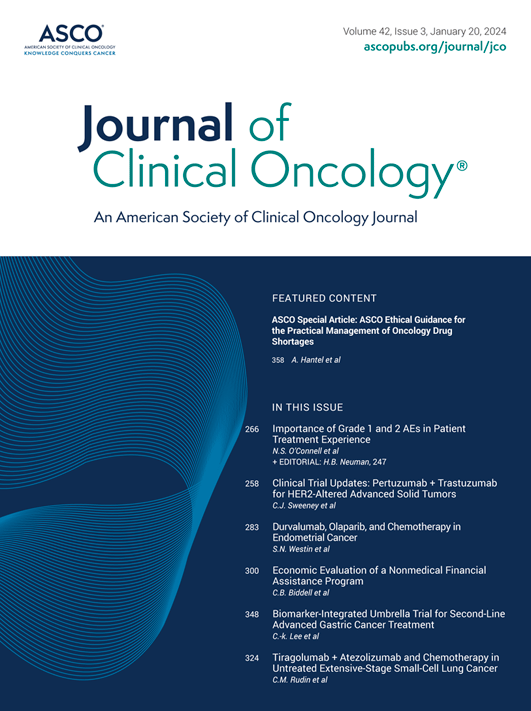单药Divarasib治疗KRAS g12c阳性非小细胞肺癌:一项I期研究的长期随访
IF 42.1
1区 医学
Q1 ONCOLOGY
引用次数: 0
摘要
Divarasib (GDC-6036)是一种口服、高效和选择性的新一代KRAS G12C抑制剂,在晚期KRAS G12C阳性非小细胞肺癌(NSCLC)患者中显示出可控的安全性和有希望的抗肿瘤活性。在这里,我们报告了正在进行的、开放标签的、多中心的I期研究(ClinicalTrials.gov标识符:NCT04449874)的单药divarasib的长期(≥1年)随访。主要目标是安全性,其他目标包括初步的抗肿瘤活性。总体而言,65例晚期KRAS g12c阳性NSCLC患者接受单药口服迪伐拉西布50- 400mg,每日一次,31例患者(48%)治疗超过1年。Divarasib耐受性良好,1年以上的安全性与总体安全性一致。在所有剂量水平基线时可测量疾病的患者中(n = 63),确认的客观缓解率为55.6% (95% CI, 42.5至68.1),中位缓解持续时间为18.0个月(95% CI, 11.1至24.9)。总体人群(N = 65)的中位无进展生存期为13.8个月(95% CI, 9.8至25.4),分配到400 mg剂量水平的患者(N = 44)的中位无进展生存期为15.3个月(95% CI, 12.3至26.1)。经过长期随访,divarasib在晚期KRAS g12c阳性NSCLC患者中显示出长期安全性和抗肿瘤活性。本文章由计算机程序翻译,如有差异,请以英文原文为准。
Single-Agent Divarasib in Patients With KRAS G12C-Positive Non-Small Cell Lung Cancer: Long-Term Follow-Up of a Phase I Study.
Divarasib (GDC-6036), an oral, highly potent and selective next-generation KRAS G12C inhibitor, has demonstrated a manageable safety profile and promising antitumor activity in patients with advanced KRAS G12C-positive non-small cell lung cancer (NSCLC). Here, we report long-term (≥1 year) follow-up of single-agent divarasib from the ongoing, open-label, and multicenter phase I study (ClinicalTrials.gov identifier: NCT04449874). The primary objective was safety, and the other objectives included preliminary antitumor activity. Overall, 65 patients with advanced KRAS G12C-positive NSCLC received single-agent oral divarasib 50-400 mg once daily and 31 patients (48%) were treated beyond 1 year. Divarasib continued to be well tolerated, and the safety profile beyond 1 year was consistent with the overall safety profile. In patients with measurable disease at baseline across all dose levels (n = 63), the confirmed objective response rate was 55.6% (95% CI, 42.5 to 68.1), and the median duration of response was 18.0 months (95% CI, 11.1 to 24.9). The median progression-free survival was 13.8 months (95% CI, 9.8 to 25.4) in the overall population (N = 65) and 15.3 months (95% CI, 12.3 to 26.1) among patients assigned to the 400-mg dose level (n = 44). With extended follow-up, divarasib demonstrated long-term safety and antitumor activity in patients with advanced KRAS G12C-positive NSCLC.
求助全文
通过发布文献求助,成功后即可免费获取论文全文。
去求助
来源期刊

Journal of Clinical Oncology
医学-肿瘤学
CiteScore
41.20
自引率
2.20%
发文量
8215
审稿时长
2 months
期刊介绍:
The Journal of Clinical Oncology serves its readers as the single most credible, authoritative resource for disseminating significant clinical oncology research. In print and in electronic format, JCO strives to publish the highest quality articles dedicated to clinical research. Original Reports remain the focus of JCO, but this scientific communication is enhanced by appropriately selected Editorials, Commentaries, Reviews, and other work that relate to the care of patients with cancer.
 求助内容:
求助内容: 应助结果提醒方式:
应助结果提醒方式:


